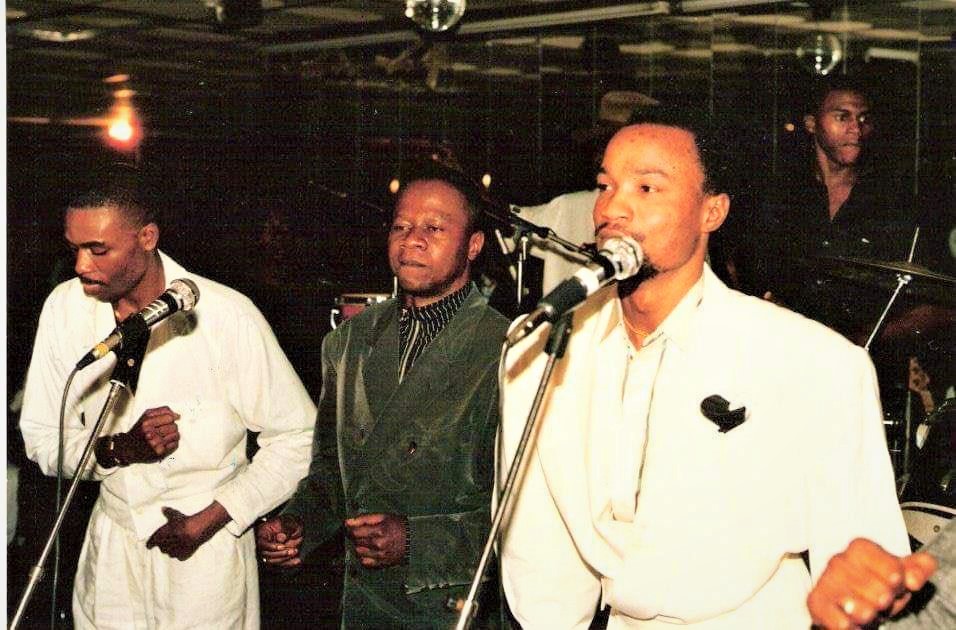Lingala legends Papa Wemba and Koffi Olomidé in 1988. See page for author, Public domain, via Wikimedia Commons
You may be familiar with Afrobeats, Amapiano, and the like, but, have you ever heard about the Lingala sound? This vibrant and rhythmic genre is deeply rooted in Congolese culture. Lingala, a captivating blend of traditional African rhythms, Latin melodies, and French influences, features infectious beats, intricate guitar riffs, and soulful vocals. This fusion gave birth to a unique musical style that was both modern and deeply connected to the region’s cultural roots, capturing the hearts of music lovers around the world. Lingala music directly enters people’s hearts and souls, and the natural reaction is to dance.
The Lingala sound, also known as Congolese rumba, traces its origins back to the early 20th century, drawing inspiration from traditional Congolese rhythms, Cuban rumba, and American jazz. The name Lingala comes from the Lingala language, spoken in the Democratic Republic of Congo, parts of the Republic of Congo, and in neighboring regions. The language’s melodious and rhythmic qualities make it an ideal medium for the lyrical storytelling that is a hallmark of Congolese music. Early pioneers of Lingala music included Franco Luambo Makundu, Papa Wemba, Wendo Kolosoy, Nico Kasanda, and others laid the foundation for the genre, developing its signature sound. These legendary musicians developed a music industry that has attracted research and publicity even to English and American writers.
This genre has not only shaped the musical landscape of Central Africa but has also left an indelible mark on global music, becoming one of Africa’s most celebrated musical genres. As Lingala music gained popularity in the 1950s and 1960s, it began to evolve, incorporating elements from jazz, funk, rock, and even electronic music. This period saw the emergence of legendary bands like OK Jazz, led by the iconic Franco Luambo Makiadi, and Afrisa International, fronted by Tabu Ley Rochereau. These artists and bands pushed the boundaries of the genre, experimenting with complex guitar lines, dynamic vocal harmonies, and rhythmic innovations that would define the Lingala sound for decades.
The 1970s and 1980s marked a golden era for Lingala music, with the rise of new stars like Papa Wemba, Koffi Olomidé, and Zaïko Langa Langa, who brought fresh energy and creativity to the genre, blending traditional elements with contemporary influences. Papa Wemba, known as the “King of Rumba Rock,” introduced a more modern and danceable style, while Koffi Olomidé’s “Tcha Tcho” music captivated audiences with its catchy melodies and sensual rhythms.
Unrest in the DRC during the 1970s sent many bands to neighboring countries such as Kenya and Tanzania. Once there, Congolese music began to influence local sounds. The influence of Lingala music can be seen in the rise of the “world music” movement in the 1980s and 1990s, which brought African sounds to a broader global audience. The 1990-2010 period is marked by the rise of the musical group Wenge Musica. The 2010 period saw the emergence of two great figures, Fally Ipupa (ex-musician of the Latin Quarter International group of Koffi Olomide) and Ferre Gola (former musician of Wenge Musica group then of Wenge Musica Mother House of Werrason). Despite its evolution over the years, its popularity remains strong both within the DRC and among the African diaspora.
Popular Lingala Artists and Songs
Lingala music boasts a rich legacy of legendary musicians and bands. Here are some of the most famous Lingala musicians from the heart of Congo:
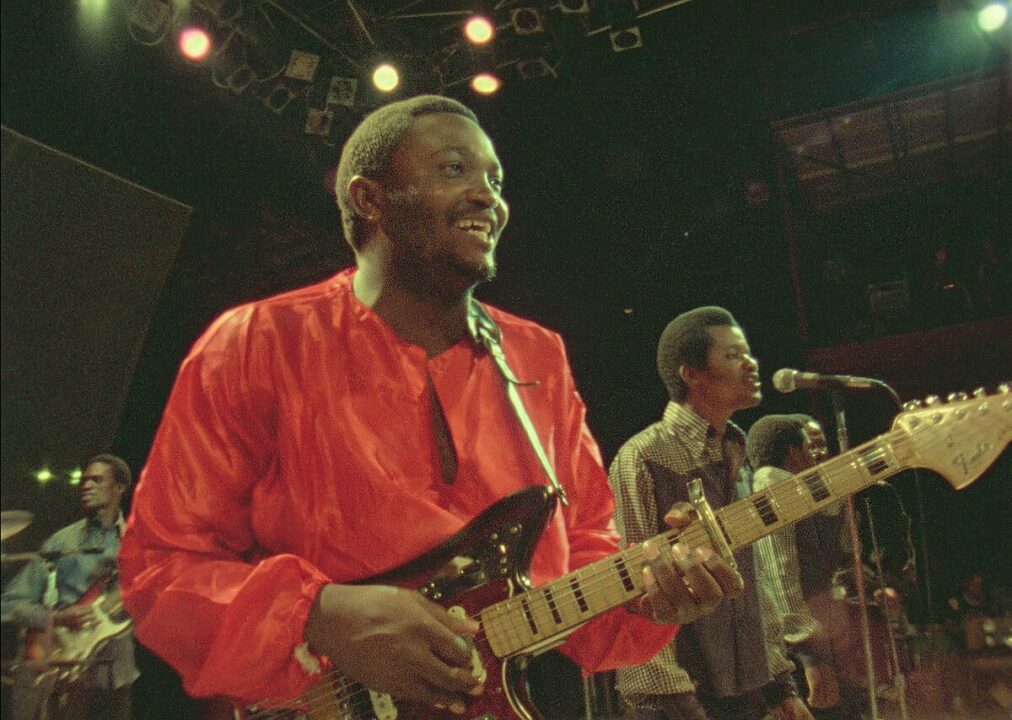
Franco Luambo and his band OK Jazz performing in 1974. Therumbakings.com, Public domain, via Wikimedia Commons
Franco Luambo (1938-1989): A legendary figure in Congolese music, Franco became synonymous with Lingala music, earning the title of “Le Grand Maître” (The Grand Master) for his contributions to the genre. He is known for his innovative guitar playing and soulful compositions which often featured extended guitar solos, intricate polyrhythms, and lyrics that addressed social, political, and personal themes. Franco’s music resonated with listeners across Africa and beyond, solidifying the Lingala sound’s place on the world stage. His most known hit, “Mario“, sold more than 200,000 copies and was certified gold. He also recorded a 21-minute track, “Na Lingaka Yo Yo Te”, which happens to be the longest song recorded by a Congolese artist.
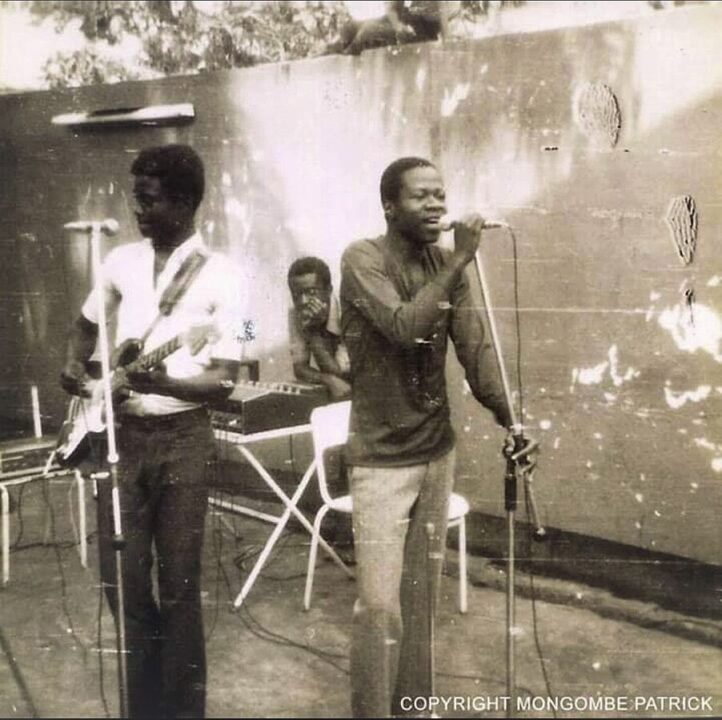
Félix Manuaku Waku and Papa Wemba In Kinshasa, Zaire, 1970. Patrick Mongombe, Public domain, via Wikimedia Commons
Papa Wemba (1949-2016): One of Africa’s best-loved global musicians, he was a trailblazer in the Lingala and soukous genres and an active and effective ambassador of the globalization of Congolese popular music. Known for his distinctive style, Papa Wemba blended Lingala music with elements of salsa, reggae, and rock. The King of Rhumba Rock, as Papa Wemba is known, was the second Congolese artiste after Tabu Ley Rochereau, his mentor, to sign with the international music label, Real World, owned by Peter Gabriel. Under the label, he produced three albums, The Traveller (1992), Emotion (1995), and Molokai (1998). His band, Viva La Musica, produced hits like “Yolele” and “Show Me the Way.”

Koffi Olomide performing in 2024. Romario COFFI, CC BY-SA 4.0, via Wikimedia Commons
Koffi Olomide (1956): Often called Grand Mopao (The Big Boss), he has enjoyed immense success as a Lingala musician This contemporary star who has popularized Lingala music worldwide with his energetic performances and catchy songs has earned a global fanbase. He joined Papa Wemba’s band Viva La Musica in the late 70s and left in 1986 to form his band called Quartier Latin International, which has released numerous hits, including “Papa Ngwasuma” and “Loi.”
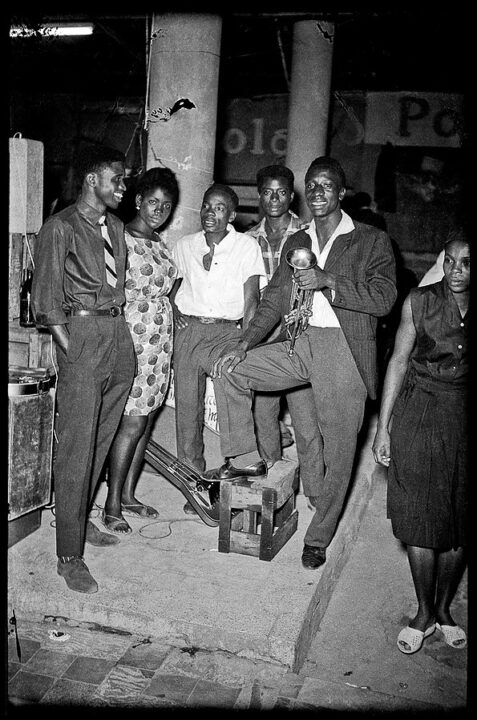
Tabu Ley Rochereau (right). Source: Lemvo Jean Abou Bakar Depara, CC BY-SA 4.0, via Wikimedia Commons
Tabu Ley Rochereau (1940-2013): Another giant of Congolese music, Tabu Ley was renowned for his captivating voice and poetic lyrics. His contributions to the genre earned him the nickname “the Voice of Lightness.” This legendary figure internationalized Soukous by creating a fusion of Congolese folk music and Cuban, Caribbean, and Latin American rumba. With his band, Afrisa International, he produced timeless hits like “Muzina” and “Sorozo.”
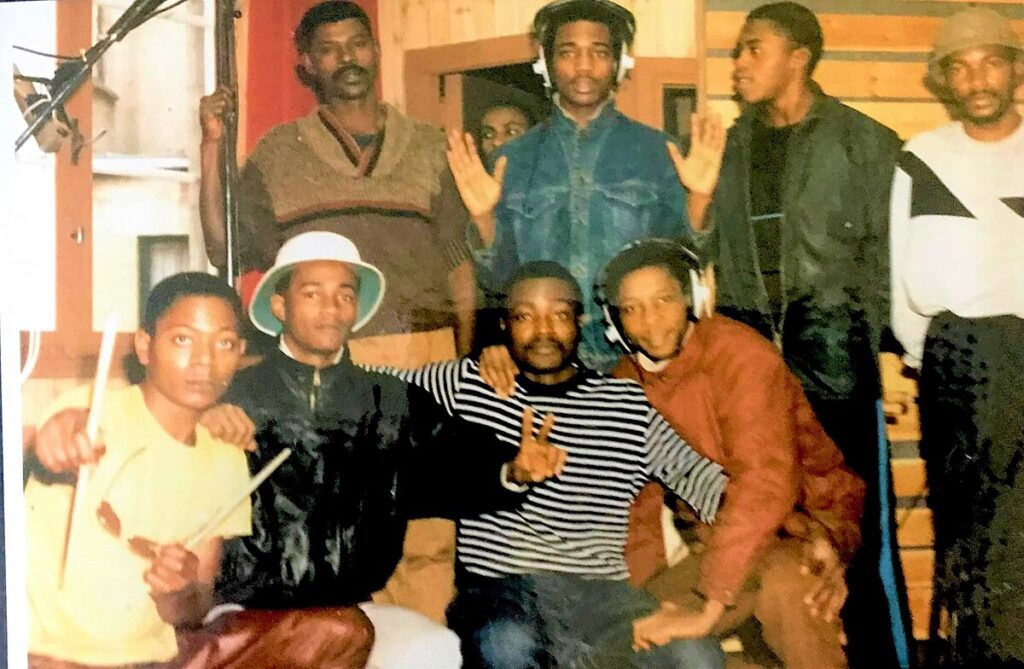
Awilo Longomba and Viva La Musica in 1986. Source: https://postlmg.cc/LJ1crr25, CC BY-SA 4.0, via Wikimedia Commons
Awilo Longomba (1962): The legendary Congolese singer brought his infectious energy to the Lingala genre. His fusion of Lingala and soukous created a unique danceable sound. Most of us grew up dancing to his songs. “Coupé Bibamba,” often regarded as one of Africa’s most acclaimed Lingala songs, was so popular that everyone sang along to it although the lyrics were delivered partly in French and partly in Lingala language.
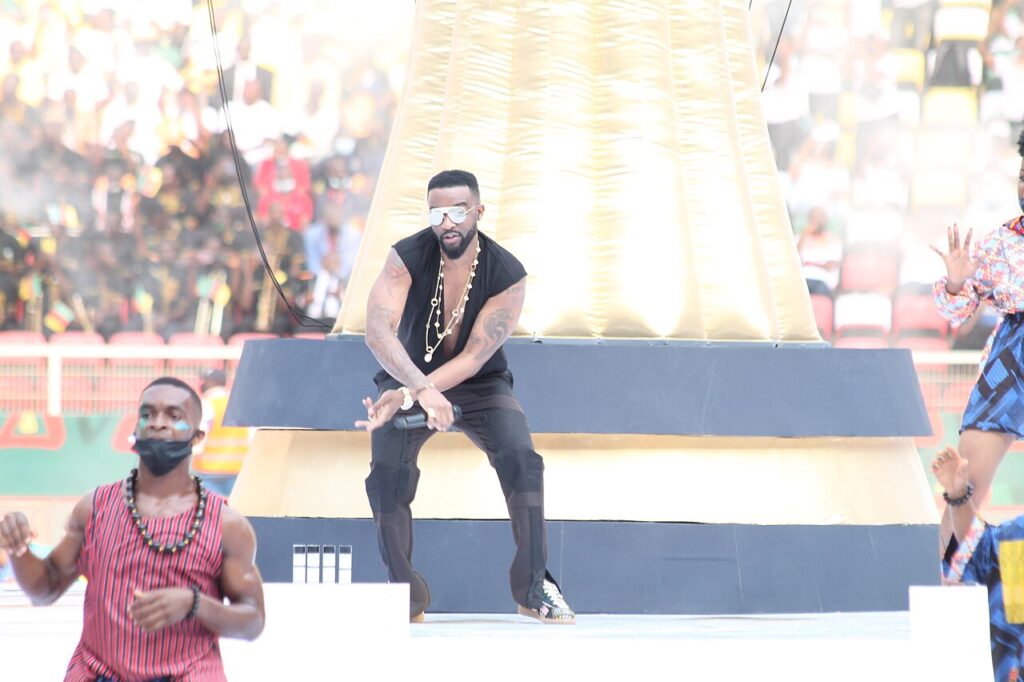
Fally Ipupa performing at AFCON 2021. By Effathéophile105 – Own work, CC BY-SA 4.0, Wikimedia Commons
Fally Ipupa (1977): Fally Ipupa, often referred to as the “Prince of Lingala,” has played a pivotal role in bringing the genre to younger audiences. This contemporary Lingala superstar went solo in 2006 after a seven-year skyrocketing career at Koffi Olomide’s Quartier Latin. His solo career took off with albums like Droit Chemin and Arsenal de Belles Mélodies. His music blends traditional Congolese rhythms with contemporary pop and urban sounds, making it accessible to a new generation of listeners. Songs like “Eloko Oyo” and “Aime-moi” have garnered millions of views on YouTube, showcasing the enduring appeal of the Lingala sound in the digital age.
Lingala music is alive and well, with new generations of artists carrying on from where their predecessors stopped. Despite evolving, the genre remains a vibrant force both in the DRC and among the African diaspora. Contemporary artists like Fally Ipupa, Ferre Gola, and Innoss’B are keeping the Lingala tradition alive while infusing it with modern elements of hip-hop, R&B, and electronic music. Whether you’re a fan of African music or simply looking for something new and exciting, Lingala is worth checking out. So, the next time you’re tapping your feet to the beat of Congolese music, appreciate the rich history and global influence behind this captivating sound that has transcended borders and touched countless lives.

